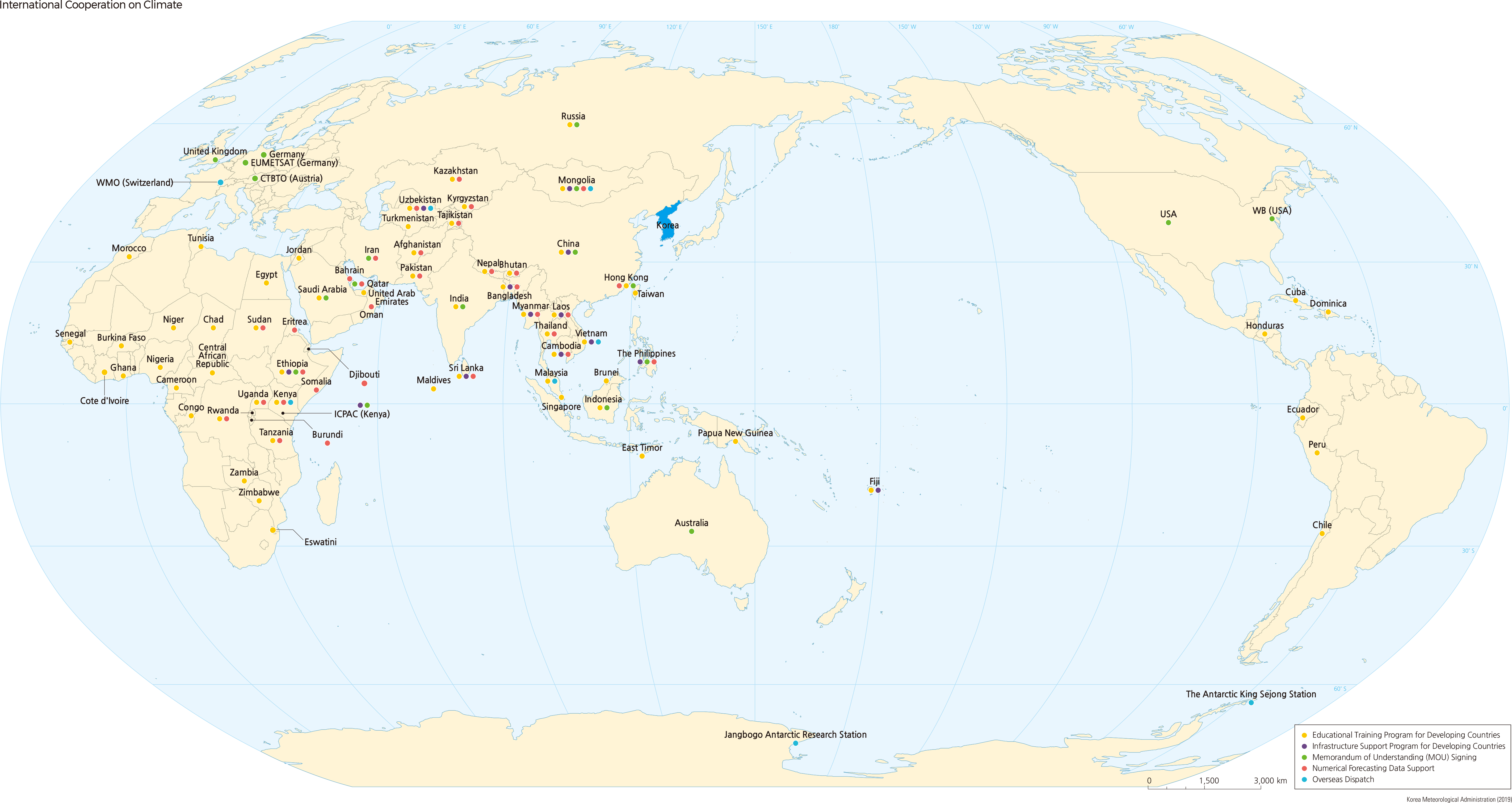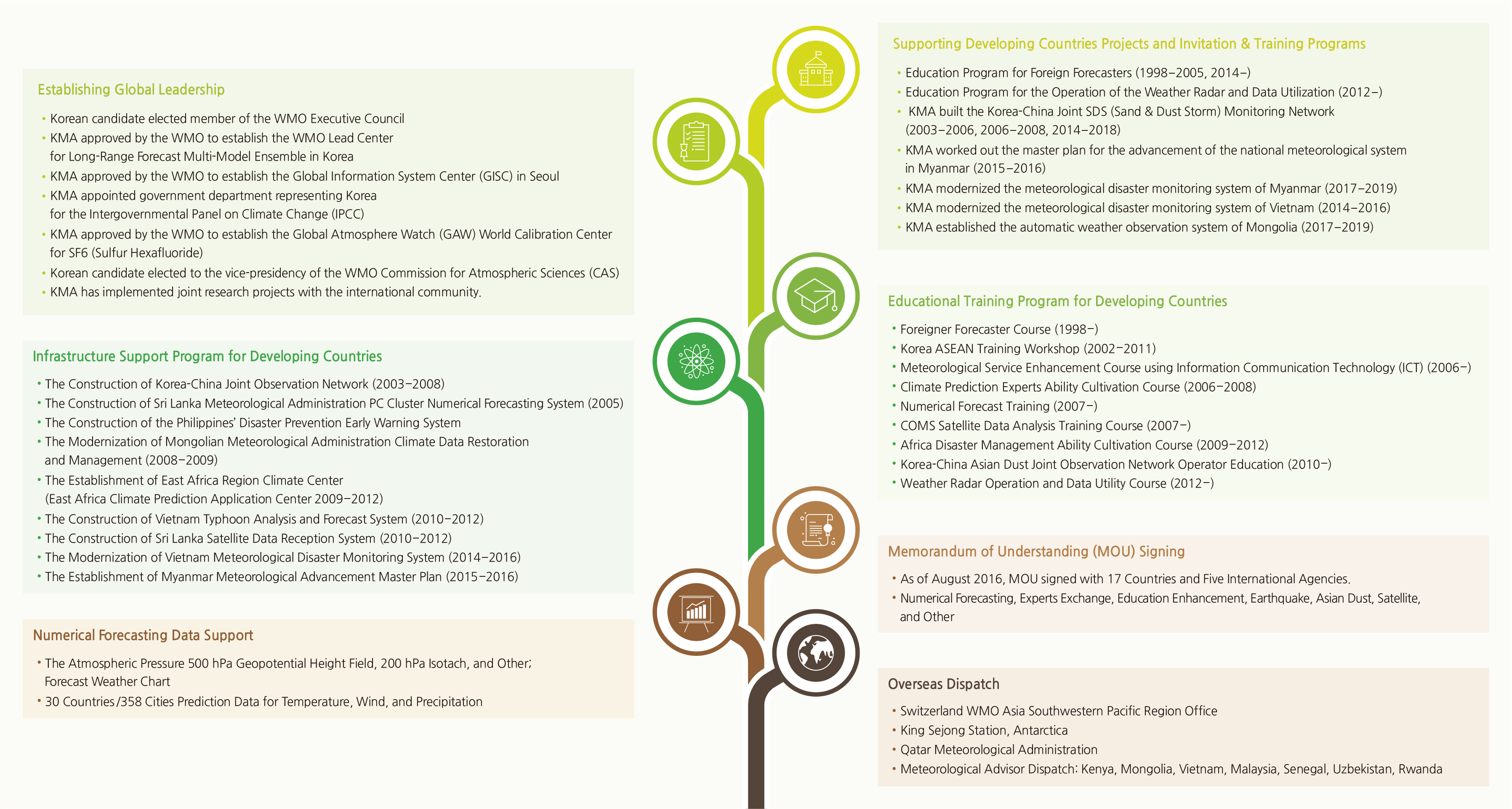English II 2020
Korea carries out multilateral cooperation through international organizations, including the World Meteorological Organization (WMO). WMO is one of the UN agencies specialized in the meteorological field, with international authority over issues regarding atmospheric flow, the interaction between atmosphere and ocean, and climate-hydrology. After the founding of the WMO in 1950, its membership has grown to a total of 191 countries, including Korea, which joined as the 68th country in 1956.
The Korea Meteorological Administration (KMA) has been keeping its status as an executive council member of the WMO since 2007. The executive council is a core executive agency of the WMO, taking charge of supervising main policies such as the coordination of scientific technology and budget allocation. It is composed of head administrators from 37 member countries. The election of KMA’s head administrator as an executive council member at the 17th World Meteorological Congress, in Geneva, Switzerland, 2015 was a great achievement for Korea as it raised the nation’s status to a third term executive council member country. This could not have been possible without Korea’s active participation in diverse international activities in meteorological field, headed by the WMO. As of 2016, the percentage of Korea’s financial contribution to the WMO is 2.01%, which ranks Korea as 13th among member countries. The KMA is expected to strengthen its contribution as a part of a leading international meteorological community group.
Also, the KMA was officially designated as a WMO Regional Training Center (RTC) at the 17th World Meteorological Congress due to its international reputation for outstanding performance on education-training sections. Since then, the KMA has been equipped with an enhanced system, enabling Korea to share its long-accumulated expertise, technology, and experience with other members of the WMO. With the system, the KMA is planning to make specialized educational courses in accordance with the WMO education policy to lay a foundation for the RTC operation base. Another noticeable accomplishment is the election of the first Korean chairman of the IPCC (Intergovernmental Panel on Climate Change), which has unparalleled authority over global climate change negotiations. The IPCC is an agency established jointly by the WMO and the United Nations Environment Programme (UNEP) in 1988 to handle climate change issues. The election of a Korean chairman of the IPCC in 2015 demonstrates the nation's international renown for coping with climate change. The KMA continues to fortify its position and influence in the international meteorological community by actively participating in international activities and training domestic experts.
In 1994, a memorandum of understanding (MOU) on bilateral cooperation in the field of meteorology between the KMA and the China Meteorological Administration (CMA) was made. Since then, MOUs on bilateral cooperation in meteorology were made with the Australian Bureau of Meteorology in 1996, the Russian Federal Service for Hydrometeorology and Environment Monitoring in 1999, and the U.S. National Weather Service in 2000. Also, MOUs with Qatar and Saudi Arabia were made respectively in 2013 and 2015, not only extending KMA’s meteorological cooperation with the Middle East countries but also paving the way for expanding the Korean weather industry around the world. As a result, up until 2016, a total of 17 countries and 5 international agencies have made agreements on bilateral cooperation with the KMA.
The KMA has been keeping a strong reciprocal relationship with its partners by holding bilateral cooperation convention in every 2 to 3 years, operating working groups, and dispatching experts. In addition, the KMA is promoting cooperation with developed countries, including the US and the UK, to acquire state-of-the-art technologies such as next-generation meteorological satellite technology, the introduction of the Unified Model, and operational technology. Moreover, the KMA promotes a cooperation system with developing countries such as Vietnam and Mongolia, with the ODA program and capacity development program operation as the central figures. The capacity of ODA began to develop in 1998 through the educational programs of the KMA and KOICA. Since then, there have been training courses such as a weather forecast training course for about 700 meteorological trainees from 69 countries. These courses contribute greatly to the development of the capability to predict meteorological disasters in developing countries by cultivating staff for meteorological administration with abilities to utilize radar, acquire the advanced technique of weather forecasting, and understand and utilize numerical forecasting.
The KMA actively participates in the technical committees of the World Meteorological Organization (WMO), which plan and discuss weather-related technologies and policies. The KMA held the Commission for Basic Systems (CBS) in 2007, Commission for Atmospheric Sciences (CAS) in 2009, the World Meteorological Organization/Intergovernmental Oceanographic Commission (WMO/IOC) Commission for Oceanography and Oceanography and the Oceanography and Marine Meteorology (JCOMM) during the Yeosu Expo in 2012, and the general meeting of the Commission for Agricultural Meteorology (CAgM) in 2018 in Korea. The KMA operates WMO’s Global Information System Center (GISC-Seoul), Lead Center for Long-Range Forecast Multi-Model Ensemble (LC-LRFMME), The Subseasonal-to-Seasonal Prediction Project International Coordination Office (S2S-ICO), and Regional Training Center (RTC-Korea) in Korea. Through these engagements, the KMA actively participates in sharing climate forecast information and real-time collection and exchange of weather data around the world and leads the capacity development of WMO member countries, centering on the Asian Pacific region.
The KMA, as a governing body of the Intergovernmental Panel on Climate Change (IPCC), has formed a government delegation composed of related ministries and has attended the IPCC General Meeting 2-3 times a year from the 11th IPCC General Meeting in 1995 to the present. The KMA leads Korea's participation in the IPCC by holding the 48th IPCC General Meeting in October 2018 in Incheon, Korea, and by supporting many domestic experts in the IPCC activities. A Korean, Dr. Hoesung Lee, was first elected as a chair of the IPCC at the 42nd IPCC General Assembly in October 2015. He leads the IPCC until 2023, when the 6th Assessment Report (AR6) is finalized. In addition, the KMA is jointly participating with relevant government ministries in intergovernmental negotiations of the United Nations Framework Convention on Climate Change (UNFCCC) to stabilize greenhouse gas concentrations to the level that can prevent changes in the climate system caused by greenhouse gases. The KMA also promotes the following projects for developing countries: the construction project of an automatic weather station system, the construction project of a system for receiving and analyzing satellite signals of the Cheonlian Satellite 2A, and the construction project of an integrated platform for monitoring and forecasting typhoons.
Building the capacity of ODA began in 2003 in cooperation with the KOICA and WMO. So far, about 20 programs, including modernizing the Mongolian aviation weather, constructing the early warning system to mitigate the disasters in the Philippines, advancing the Vietnamese meteorological disaster monitoring system, and establishing a master plan for the advancement in meteorological technology of Myanmar, have been completed. Supporting developing countries in their effort to advance in meteorological technology through the installation of large-scale systems helps promote domestic meteorological technology. It has contributed to increasing the export of Korea's meteorological brands and domestic meteorological enterprises.
World Friend Senior Expert Dispatch Program, conducted by the Ministry of Science, ICT and Future Planning and carried out by the National IT Industry Promotion Agency, is a program dispatching senior experts to developing countries to support and provide advice regarding meteorological technology. Teams of meteorological advisors have been sent 19 times to countries such as Vietnam, Mongolia, Kenya, and Uzbekistan from 2010 to 2016. With their efforts, the KMA was able to identify demand in meteorological technology in those countries and has consolidated its international status. |

